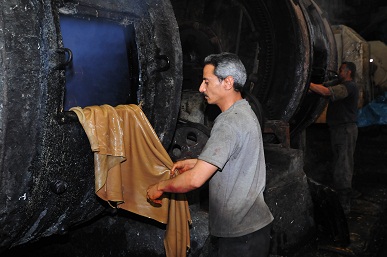By Patrick Werr and Sherine El Madany / Reuters
CAIRO: Egypt is pinning its hopes on natural gas to help it reduce energy subsidies that are eating up 20 percent of its state budget and are likely to continue growing if measures aren’t taken soon.
For years, the government has resisted cutting subsidies for fear of igniting inflation and the wrath of its citizens. It is now under renewed pressure to tackle the issue as it negotiates a $3.2 billion emergency loan from the International Monetary Fund to avert a balance of payments crisis; the IMF is expected to require a commitment from Cairo to reform its finances.
The subsidy problem has become more difficult politically since the uprising which overthrew president Hosni Mubarak last year, because the turmoil slashed economic growth, pushing up unemployment and poverty.
At the same time, a solution has become more urgent financially. In the last six months the government has struggled to finance a budget deficit inflated by post-uprising demands for higher wages and lower revenue growth.
Egypt’s energy subsidy bill is projected to soar 40 percent to LE 95 billion ($15.75 billion) in the current financial year which ends on June 30, because of a jump in international energy prices and a growing population, according to figures provided by three sources familiar with the government’s calculations. They declined to be identified because of the political sensitivity of the issue.
Oil Minister Abdullah Ghorab told reporters on Monday that budget allocations to keep down retail prices of petroleum products were scheduled to increase more than 25 percent in the next financial year to LE 120 billion.
Solving the energy subsidy conundrum “is crucial now because the fiscal state is very tight,” said Nada Farid, an economist with Beltone Research.
“All the political parties, the IMF and the government are saying that energy subsidies must be tackled as soon as possible. It’s about having a government that is able to actually take decisions.”
Egypt subsidizes almost all of its energy products, including gasoline; its average domestic retail price of 23 US cents per liter (87 cents per US gallon) is among the cheapest in the world. Although the country exports natural gas, it imports some of its oil.
Cheap subsidized prices have contributed to a surge in energy consumption that the country can ill afford. In the last few years, consumption of liquefied petroleum gas (LPG) has been rising at an annual rate of 10 percent, gasoline at 12 percent, diesel at 6 percent and fuel oil at 6 percent, according to figures provided by a Cairo-based energy firm.
About 44 percent of government subsidies go to diesel, used mainly by transport and industry, and 22 percent to fuel oil, used by industry and power plants, the figures showed.
Switch to gas
To some extent, the government is hoping to cut subsidies through the relatively painless strategy of switching to greater use of natural gas from more expensive fuel oil and diesel. Gas might have to be imported from abroad if Egypt remained committed to its own gas export contracts, but imported gas would cost the country only $7-8 per million British thermal units), compared to $17 per per mbtu that it pays for fuel oil, said a Cairo-based energy specialist.
“The government has outlined plans to expand the use of natural gas in households as well as in commercial, industrial and touristic facilities to save the country the value of petroleum subsidies,” Ghorab said at a ceremony to mark the conversion of a brick making factory to natural gas.
This strategy pleases the Muslim Brotherhood’s Freedom and Justice Party (FJP), which took almost half the seats in the new parliament elected in January and obtains much of its support from Egypt’s poorest people.
Saad Al-Hoseiny, an FJP member who chairs parliament’s Planning and Budget Committee, said his party would reject rises in domestic energy prices for households and instead insist that power plants, factories and transport use natural gas.
“These are measures that can be implemented easily and need to be done immediately,” Hoseiny told Reuters. “They would save up to LE 20 billion and would be faster than removing energy subsidies.”
He said delays in switching to gas were the result of corruption, bureaucracy and poor cooperation between ministries. “Every ministry acts as an island unto its own. There are those who benefit from importing fuel oil — huge commissions and profits for the companies that import the fuel oil.”
Cutting subsidies
But switching to gas will not by itself bring the subsidy bill down sufficiently, so the government is also embarking on other measures, including a plan to limit the sale of canisters of LPG cooking fuel to ration card holders.
These canisters now cost the government about LE 75 each to fill, but it sells them for about LE 5. Under the new plan, implemented so far only in the sparsely populated Red Sea and New Valley provinces, each family can take only one or two canisters per month, depending on how many members it has.
The government also announced at the beginning of this year that it was raising the price of energy supplies to industry, though this has not been fully implemented so far.
Taher Gargour, deputy chief executive at ceramics maker Lecico, said his firm had been charged at the old rates until Monday, when it received an electricity bill featuring a 22 percent price hike retroactive to the start of the year. He said the company understood its natural gas cost would increase by 30 percent to $3 per mbtu, and was planning for this change although it was not sure it would happen.
The higher energy prices would increase Lecico’s cost of sales by 3.5 to 4 percent in a business with a gross margin of 20 to 30 percent, he said.
“I think the government is hesitating because this will have a huge impact on industries like ours. If you look at these increases, you’re talking probably about a 25 percent blended increase in the cost of energy.” That means less investment, more inflation and fewer jobs created, Gargour said.
Importing energy
Egypt produces the equivalent of about 1.55 million barrels of oil per day, of which 45 percent is crude oil and the rest natural gas. Of that, the government gets 59 percent and the oil companies which conduct exploration and drilling get the rest.
The government’s portion covers only about two-thirds of domestic consumption, which means it must buy the rest from the foreign firms working in Egypt or import energy from abroad. Over the last six months the government has increasingly resorted to buying from companies on credit as it runs out of funds, said the Cairo-based energy specialist.
The government is now several billion dollars in arrears, he said. A foreign banker, an energy trader and a Western economist have also told Reuters that Egypt has postponed some payments to energy companies operating in the country.
Companies outside the country, worried about the government’s growing budget deficit, late last year began demanding cash up front for gasoline deliveries to Egypt, the energy specialist said. –Additional reporting by Marwa Awad


